Study of Fingerprint Patterns in South Indian Population
DOI:
https://doi.org/10.48165/Keywords:
Dactylography, Fingerprint Pattern, Gender Difference, IdentificationAbstract
Study of finger prints as a method of identification is known as Dactylography or Dactyloscopy Dactylography is a progressing science and new methods for the recording, lifting and developing of prints under different field conditions, including those from the decomposed body, are being introduced regularly. Identification using finger prints is absolute and infallible. Since the turn of the century, finger prints have been used as a very effective means of establishing identity of the individual. Study of finger prints as a method of identification is known as Dactylography. The present study was conducted on 100 males and 100 females of South Indian Population aged between 18 and 81 years. Rolled fingerprints were obtained using pre-inked strips, and their patterns were identified. Each type of fingerprint pattern and their subtypes were identified and analysed for gender differences.
Downloads
References
Karmakar RN. J B Mukherjee‟s Forensic Medicine and Toxicology. 3rd Ed; 2007: 166-173.
Nandy A. Principles of Forensic Medicine. 3rd Ed. New Central Book Agency (P) Ltd; 2010: 158-163.
Kumar A. Textbook of Forensic Medicine, Medical Jurisprudence and Toxicology). 1st ed. Avichal Publishing Company; 2011: 4-5. 4. Mathiharan K, Patnaik AK. Modi‟s Medical Jurisprudence and Toxicology. 23rd ed. Lexis Nexus Butterworth; 2005: 314-320. 5. Vij K. Textbook of Forensic Medicine and Toxicology- Principles and Practice. 5th ed. Reed Elsevier India (P) Ltd; 2011: 62-64. 6. Dikshit PC. Textbook of Forensic Medicine and Toxicology. 1st ed. Peepee Publishers and Distributors (P) Ltd; 2007: 80-85. 7. Basu R. Fundamentals of Forensic Medicine and Toxicology. 1st ed. Books and Allied (P) Ltd; 2003:40-44.
Mant AK. Taylor‟s Principles and Practice of Medical Jurisprudence. 13th ed. B I Churchill Livingston; 1994: 176-177. 9. Parikh CK. Parikh‟s Textbook of Medical Jurisprudence and Toxicology. 5th Ed; 1986: 53-57.
Reddy KSN. The Essentials of Forensic Medicine and Toxicology. 31st Ed; 2012: 76-79.
Polson CJ. The Essentials of Forensic Medicine, 2nd ed. Pergamon Press Ltd; 1965: 75-78.
Bardale R. Principles of Forensic Medicine and Toxicology. 1st ed. Jaypee Brothers Medical Publishers; 2011: 72-76.
Chandrachud YV, Manohar V R, Singh A. Ratanlal and Dhirajlali‟s – The Code of Criminal Procedure Code. 18th ed. Wadhwa and Company; 2006
Saukko P, Knight B. Knight‟s Forensic Pathology, 3rd ed. Hodder Arnold; 2004: 101-102.
Krishnan M KR. Handbook of Forensic Medicine. 3rd Ed; 1971: 47- 51.
Padmanabhan AM. Role of Fingerprint Science in Police and Judiciary. 1st Ed; 2008.


